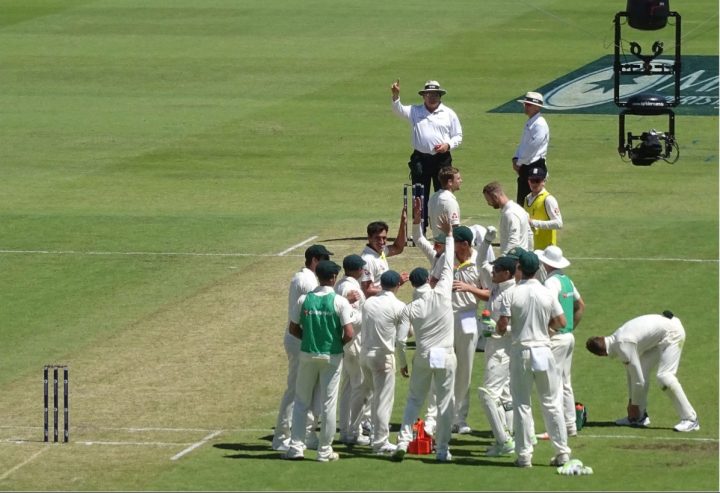Rotate the bowlers? Jettison Johnny? Up the ante? Here’s our take on the big talking points from Trent Bridge – and we’d love to hear yours.
How well are we actually playing? Jonathan Agnew, who knows a thing or two about the game, argued yesterday that England must be more ruthless. Repeatedly in the series so far, our side has dropped the intensity and allowed the West Indies to reclaim some of the initiative. That just won’t do against South Africa, he points out. From another point of view, though, England have proved effortlessly superior – we won this test by nine wickets inside four days, and beat the tourists by eight wickets at Lord’s.
The truth is probably somewhere in the middle. West Indies have fought much harder than India did last summer, and perhaps more tenaciously (in patches) than Australia did in the last couple of 2010/11 Ashes tests. You can only play the opponent in front of you, the old saying goes, and that’s just as true if they rally as when they’re supine. We’ve been less dominant than usual for the principal reason that West Indies have intermittently played some decent cricket. You can beat someone who’s playing well, but you’re unlikely to thrash them. Even at their peak, Australia never won every single match by enormous margins.
As England fans, our expectations have become unrealistic, swollen by 2011’s ridiculously emphatic win over India. We now resent any failure to win inside three days by an innings, so we nitpick and exaggerate any minor disappointment. But all of that said, there is still a sense, difficult to entirely dismiss, that the England machine has not quite clicked into full functionality. I can’t quite put my finger on either the evidence or cause, but two things come to mind: the bowlers losing tenacity when the ball is soft, and a vague malaise around the middle order. I have a feeling in my bones that Matt Prior is in for a difficult summer.
Drop Bairstow? This is an almost unbelievably silly suggestion. So far, he has only actually batted twice. What can you soundly deduce, either way, from two innings? To say he justifies a proper run in the side is axiomatic. As Graham Gooch will tell you – he made a pair on debut – dropping him now would injure his career, and abrade the team’s cohesion, to no advantage.
I’m only an armchair punter, but I’m confident about this next assertion: the talk of Bairstow’s weakness against the short ball is a red herring. No other England player, in this match, was subjected to an intense short-ball scrutiny in the way Bairstow was. At the time, Roach was really purring – is anyone claiming that neither Bell, nor KP, Trott or Prior might have been discomfited too? In the Ashes Oval test of 2009, Ian Bell was very nearly dismissed about a dozen times by Mitchell Johnson short balls which somehow kept managing to evade short leg. Bell was by then an experienced test player; because it was far from the most significant phase of the match, everyone forgot about it afterwards.
Rotation policy An intriguing one this, but we shouldn’t get misled. The cricket media have worked up this theme because they have little else to talk about: the punditariat needs a debate to wrestle with. Rotating the bowlers is no more or less expeditious – in terms of what’s best for the team – than it was a month or a year ago.
Is it a good idea, for example to give Onions a game and rest the injury-prone Broad? My frank response is – how the hell should I know? Only the bowlers themselves, the captain and coach, and the inner circle around them, can gauge the levels of stamina, fitness and preparedness involved in making that kind of decision. The rest of us are guessing.
But as spectators, we are party to the principle of the issue. My view, as a supporter, is that rotation smacks slightly of arrogance, rather akin to Manchester United fielding three seventeen year-olds after winning the league with five matches to spare. The act suggests that the test match is not to be taken seriously – that it’s a dead game unworthy of the ‘proper’ players. That’s not very nice for the paying punters, nor very respectful to the opposition.
On the other hand – and isn’t cricket a game of equivocation? – Andrew Strauss was rested from the 2010 tour to Bangladesh, and he was the captain. The intention was to keep some of his powder dry for that winter’s Ashes. It worked, but of course we would almost certainly have won anyway.
Thoughts?
Maxie Allen









The problem re: bairstow is that there are quality cricketers waiting in the wings. Not batsmen though, they’re bowlers. Should we pick a world class 5th bowler or a sixth batsman who is wet behind the ears and possibly out of his depth? Would the Windies pick kirk Edwards ahead of someone like Ian bishop?! Surely there is only one sensible answer. But it wont be the option England choose. Having given bairstow a chance, the current set up will stick with him – even if the extra bowling option was shane warne or Richard hadlee. People forget that good selection is about making hard decisions, not just sticking with players come what may and repeating the consistency of selection mantra. There needs to be a balance. English cricket has gone from one extreme, where players were dropped Willy nilly, to ultra conservatism.
It’s never going to happen, but if the rumour that Prior is carrying a niggle is true, he could be rested, Bairstow could keep wicket and Finn/Onions could be given a run out, without having to rest any of our in form quicks.
The sixth batsman has been a problem for England, with Morgan, Bopara, and (so far) Bairstow all being indifferent or worse. I think it would be better to just chop the position and put Prior at 6, then play Bresnan AND Finn, instead of one or the other. We effectively play half our games or more with little or no contribution from the sixth batsman, so why not reinforce success instead of failure and bring in one of our many world-class fast bowlers waiting in the wings. Perhaps alternate with Patel when the pitch is more spin friendly.
Of course, the Strauss/Flower partnership is extraordinarily conservative and often surprisingly two-dimensional, so it will never happen.
I agree with the idea of resting Prior, he looks like he’s struggling with his fingers at the moment and could do with a short break. Presumably Steven Davies would come in at seven, or perhaps Chris Read (remember him?).
I can’t quite decide about rotating the bowlers. The thing is, if we are serious about remaining at #1, we need to think about margins of victory in these sort of series, because 3-0 will almost certainly be worth more ranking points than 2-0 or, perish the thought, 2-1. On the other hand, if the likes of Onions, Finn, and Dernbach are such good cover, theoretically we shouldn’t notice much of a difference. Bearing in mind we are one test short this summer (cheers for that, ECB), I think I’d just about resist temptation and stick with the same attack.
Is the ‘number one’ status really our definitive goal? After all, the table is calculated in quite an arbitrary way – under a different analysis, SA would be top. Surely the priority remains what it’s always been – to win series. Does the margin of victory really matter?
Winning becomes a habit. Also, the very fact you keep winning makes it more likely you will win. Australia used to win the bulk of their games before they got on the pitch. It was clear from the way a lot of teams talked and behaved (think Nassar at Brisbane) that they never really believed they could beat Australia and, in turn, they didn’t.
If people starting thinking they can’t beat you, half the job is already done. Giving away games on experiments doesn’t help that. Probably has other benefits, though.
They should rest Broad. I know he’s had a few more days rest between matches but he really is injury prone and they are going to want him to play the ODI’s against Aus and all the test matches against SA. It’s not arrogance, it’s pragmatism.